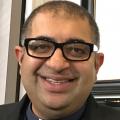
ON Monday the Church of England calendar commemorated and remembered three very different people who all died on October 12. Wilfrid of Ripon died in 709 and had a colourful ecclesiastical career which began with his education at Lindisfarne monastery, included being one of the main players at the Synod of Whitby, as well as appointments as Bishop of York and Bishop of Hexham.
Contemporary accounts of his life are delicate in their rendering of his ministry, suggesting that whilst his gift to the English Church was to make it more clearly a part of the church universal, “his manner and methods were not such as to draw people close to him at a personal level”.
The second person the church remembered on Monday died over a thousand years later, on October 12, 1845. Elizabeth Fry’s work as a prison reformer has been literally noted in recent times through her depiction on the back of the £5 note from 2001 to 2016. Fry began her work in 1816 at the age of 36 after a visit to Newgate Prison in the City of London where she saw more than 300 women in degrading conditions.
As a Quaker and noted preacher, Fry used her considerable energies to campaign and work not only for prison reform but also for the homeless and those in asylums.

Contemporary accounts of her life draw from the 44 volumes of her detailed diaries and journals which revealed a “complex personality which could be proud, selfish and ruthless for the cause…yet she had the gift of touching people’s hearts by her own deep religious feeling and her passionate concern for good”.
The third person commemorated on Monday of this week was the nurse Edith Cavell who was executed by firing squad on October 12, 1915.
Born into a clergy family in 1865 Cavell trained as a nurse in London and Salford before working with the Red Cross in Belgium in 1907.
On the outbreak of the First World War she became involved in caring for the wounded on both sides. She refused repatriation and then began smuggling British and French soldiers from Belgium into Holland.
She was arrested in 1915 for treason, found guilty by a court-martial and sentenced to death. The night before her execution, she said: “Patriotism is not enough. I must have no hatred or bitterness towards anyone.”
These words were later inscribed on a memorial to her near Trafalgar Square. Her strong Anglican beliefs propelled her to help all those who needed it.
In its ancient history the Church has often commemorated those teachers and bishops whom it has held to be models of faith.
But our more recent history highlights that saints come in more than one gender, are human and complex and are often to be found on the frontline – set apart not because of ecclesial greatness but for their dedication and service to the least, the last and the lost.
As we give thanks for their lives and example separated over centuries, we honour the common nature of their faith in Christ and its fuel for their dedication.
- Arun Arora is the vicar of St Nicholas Church, Durham.



Comments: Our rules
We want our comments to be a lively and valuable part of our community - a place where readers can debate and engage with the most important local issues. The ability to comment on our stories is a privilege, not a right, however, and that privilege may be withdrawn if it is abused or misused.
Please report any comments that break our rules.
Read the rules here